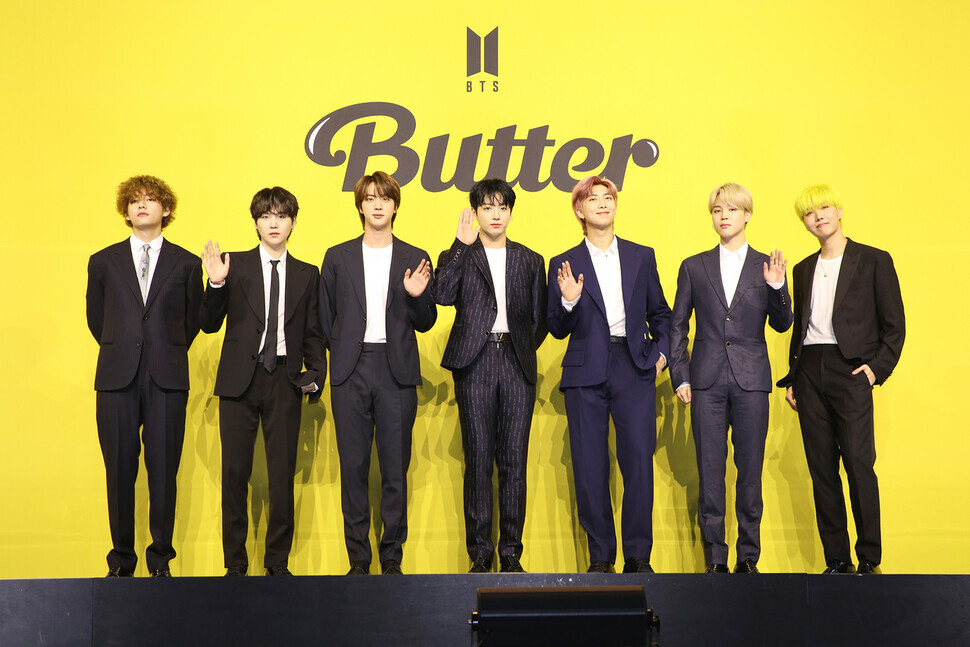hankyoreh
Links to other country sites 다른 나라 사이트 링크
Will BTS be exempt from military service? National Assembly may decide soon

A National Assembly push to amend the Military Service Act to include popular musical artists among those exempted from mandatory military service is drawing major attention.
If the amendment is passed, special allowances could be granted not just to Olympic medalists, but also to musical artists seen as having “elevated national prestige,” including members of the K-pop group BTS.
At a meeting of the National Assembly National Defense Committee’s legislative review subcommittee Thursday, discussion procedures began on a partial amendment to the Military Service Act proposed on June 5 by the People Power Party’s Yoon Sang-hyun and 15 other lawmakers.
The amendment would involve granting privileges for figures in the area of popular culture when it comes to mandatory military service. It is expected to be tabled for debate during the committee’s next meeting.
Referring to the amendment, Yoon and the bill’s other sponsors said that the current enforcement decree for the Military Service Act does not include the field of popular culture as eligible for special allowances, meaning that popular culture entertainers who have contributed to elevating national prestige have not been eligible for benefits afforded to those in other fields.
They said that the proposal to amend the law and enforcement decree was intended “for the sake of equity,” so those in the field of popular culture could be eligible for special allowances for their military service.
The current Military Service Act enforcement decree states that special allowances may be granted to individuals who realize certain achievements — medaling at the Olympics, Asian Games, and other international sports competitions in the case of athletes, and winning at classical music and dance competitions for those in the performing arts.
But singers and actors have not been entitled to special allowances even when they receive awards at international singing competitions or film festivals.
In a previous examination report, the National Defense Committee suggested it would not be receptive to the amendment.
According to its analysis, the standards for popular culture are less objective, without the same kind of indicators of credibility and representativeness as Olympic medals or awards from classical music competitions. It also voiced concerns over the equity debate intensifying as other new areas, such as breakdancing, make growing calls to expand preferential treatment.
Additionally, it cited the fact that activities in such areas were directly related to activities for personal profit.
Those in the field of popular culture have been throwing their support behind the amendment’s passage.
“In the area of fine arts, people receive military service benefits even when they win an award from a competition held by a South Korean newspaper. It’s debatable just how ‘credible’ or ‘representative’ that is,” said Choi Kwang-ho, secretary-general of the Korea Music Contents Association.
“Breakdancing, which could be seen as a form of popular culture, was adopted as an official event at the 2022 Asian Games in Hangzhou, and [South Korean performers] have a good chance of medalling there, so they could be entitled to special exemptions from military service,” he said.
Choi said the treatment faced by singers and performers was “reverse discrimination.”
By Jung Hyuk-june, staff reporter
Please direct comments or questions to [english@hani.co.kr]

Editorial・opinion
![[Column] Has Korea, too, crossed the Rubicon on China? [Column] Has Korea, too, crossed the Rubicon on China?](https://flexible.img.hani.co.kr/flexible/normal/500/300/imgdb/original/2024/0419/9317135153409185.jpg) [Column] Has Korea, too, crossed the Rubicon on China?
[Column] Has Korea, too, crossed the Rubicon on China?![[Correspondent’s column] In Japan’s alliance with US, echoes of its past alliances with UK [Correspondent’s column] In Japan’s alliance with US, echoes of its past alliances with UK](https://flexible.img.hani.co.kr/flexible/normal/500/300/imgdb/original/2024/0419/2317135166563519.jpg) [Correspondent’s column] In Japan’s alliance with US, echoes of its past alliances with UK
[Correspondent’s column] In Japan’s alliance with US, echoes of its past alliances with UK- [Editorial] Does Yoon think the Korean public is wrong?
- [Editorial] As it bolsters its alliance with US, Japan must be accountable for past
- [Guest essay] Amending the Constitution is Yoon’s key to leaving office in public’s good graces
- [Editorial] 10 years on, lessons of Sewol tragedy must never be forgotten
- [Column] A death blow to Korea’s prosecutor politics
- [Correspondent’s column] The US and the end of Japanese pacifism
- [Guest essay] How Korea turned its trainee doctors into monsters
- [Guest essay] As someone who helped forge Seoul-Moscow ties, their status today troubles me
Most viewed articles
- 1[Column] The clock is ticking for Korea’s first lady
- 2After 2 months of delayed, denied medical care, Koreans worry worst may be yet to come
- 3[Column] Has Korea, too, crossed the Rubicon on China?
- 4[Editorial] When the choice is kids or career, Korea will never overcome birth rate woes
- 5[Correspondent’s column] In Japan’s alliance with US, echoes of its past alliances with UK
- 6Hong Se-hwa, voice for tolerance whose memoir of exile touched a chord, dies at 76
- 7US exploring options for monitoring N. Korean sanctions beyond UN, says envoy
- 8Samsung barricades office as unionized workers strike for better conditions
- 9US overtakes China as Korea’s top export market, prompting trade sanction jitters
- 10[Photo] Smile ambassador, you’re on camera